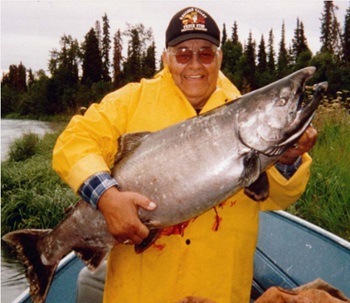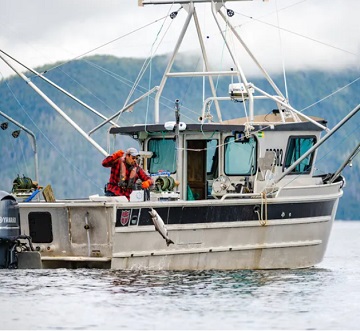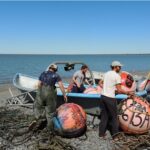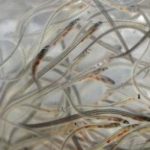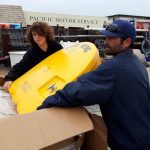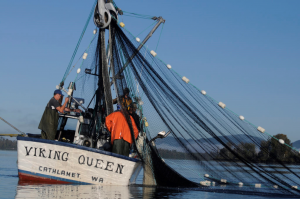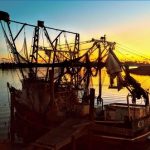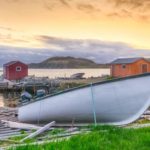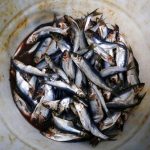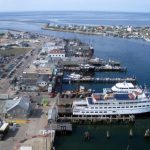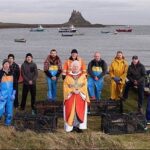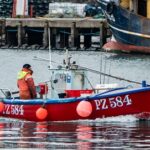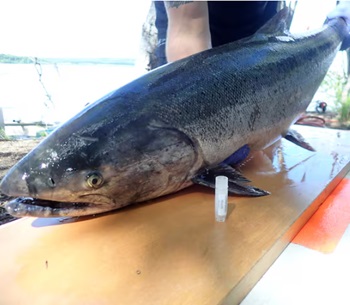 A federal appeals court on Friday reversed a judge’s decision that would have effectively shuttered an Alaska salmon fishery, a result environmentalists sought in order to protect endangered whales and threatened wild Chinook salmon populations. A three-judge panel of the San Francisco-based 9th U.S. Circuit Court of Appeals held that a judge in Seattle last year abused his discretion by vacating a key authorization issued by the U.S. National Marine Fisheries Services for the fishery’s summer and winter Chinook salmon harvests. U.S. District Judge Richard Jones at the urging of the Wild Fish Conservancy had in May 2023 vacated part of a so-called incidental take statement the fisheries service issued in 2019 that authorized the commercial Chinook salmon troll fishery in southeast Alaska. more, >>CLICK TO READ<< 10:39
A federal appeals court on Friday reversed a judge’s decision that would have effectively shuttered an Alaska salmon fishery, a result environmentalists sought in order to protect endangered whales and threatened wild Chinook salmon populations. A three-judge panel of the San Francisco-based 9th U.S. Circuit Court of Appeals held that a judge in Seattle last year abused his discretion by vacating a key authorization issued by the U.S. National Marine Fisheries Services for the fishery’s summer and winter Chinook salmon harvests. U.S. District Judge Richard Jones at the urging of the Wild Fish Conservancy had in May 2023 vacated part of a so-called incidental take statement the fisheries service issued in 2019 that authorized the commercial Chinook salmon troll fishery in southeast Alaska. more, >>CLICK TO READ<< 10:39
Tag Archives: Wild Fish Conservancy
US appeals court allows Alaska fishery to remain open
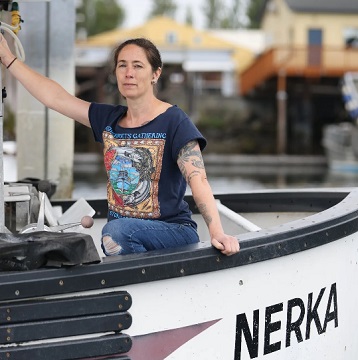
An Alaska fishery has been pitted against orcas. Can both survive?
In early May a Seattle federal judge put the brakes on this summer’s troll fishery in Southeast Alaska, ruling that the National Oceanic and Atmospheric Administration must amend its 2019 report on the impact of the fishing on endangered southern resident orcas who prefer to eat the same Chinook. But the ruling was put on hold last month by a U.S. appeals court, which allowed the fishery to reopen, citing economic harm. The complicated and contentious case probes the soft underbelly of the issue of the southern residents’ plight: the availability of nutrient-rich Chinook, their preferred meal. While fisheries up and down the West Coast are allocated fish for harvest each season, the southern residents get what’s left — and not intercepted by other predators. It has pitted fishers against orcas as some scientists and conservationists call into question the effectiveness of modern fisheries management. 9 photos, >click to read< 10:16
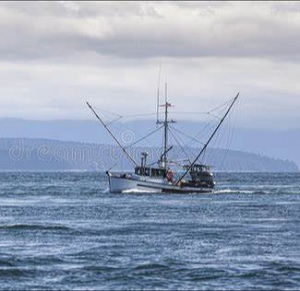
Letter: Lawsuit wrongly accuses salmon trollers
In the fall and winter, you can find me in Eastern Washington, working on building a new 50-foot salmon troller. Every year when June 20th comes, I trek north to my second home, southeast Alaska. From July to September, I can be found commercial fishing on a 40-foot salmon troller out of Sitka, Alaska. I’m not the only one who migrates every summer to southeast Alaska to make my living; other residents in Eastern Washington also head to Alaska to participate in this iconic salmon fishery. This summer is different though. Hundreds of other fishermen and I are left not knowing if we’ll have an income this year due to Wild Fish Conservancy’s attack on small-boat family fishermen through its misguided lawsuit,,, >click to read and comment<14:47
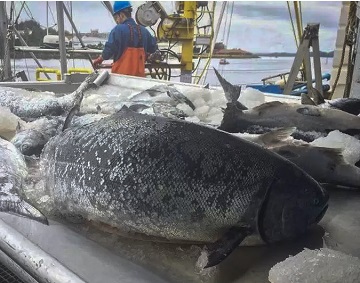
DOJ will appeal court order forcing Southeast Alaska king salmon troll fishery closure
The United States Department of Justice will appeal a federal court order forcing the closure of the commercial king salmon troll fishery in Southeast Alaska. In early May, Washington U.S. District Court Judge Richard Jones upheld an earlier recommendation that the Southeast summer and winter king fisheries were catching too much of the food source of a dwindling population of Puget Sound’s Southern Resident killer whales, in violation of the Endangered Species Act. The defendant intervenors in the case, the Alaska Trollers Association and the State of Alaska, filed motions earlier this month calling for a “partial stay” of the order, pending an appeal to allow the fisheries to proceed. >click to read< 15:58
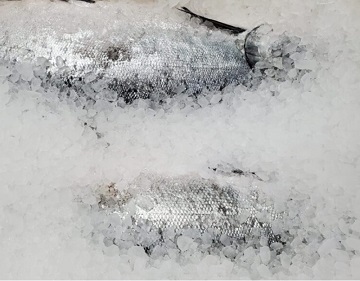
Alaska trollers will feel pain and unnecessary hardship from ruling on orca lawsuit
As president of Seafood Producers Cooperative, representing nearly 400 fishermen-owners, who reside in California, Oregon, Washington and Alaska, I want to convey our great disappointment and frustration with the recent ruling concerning the Wild Fish Conservancy and their lawsuit directed at our Salmon Troll fleet. The WFC found a technicality in National Oceanic and Atmospheric Administration’s biological opinion for troll-caught king salmon. No other fishing gear groups are being attacked and other commercial and sports fishermen in the region – and in the Puget Sound – will continue to harvest king salmon. >click to read< 08:59
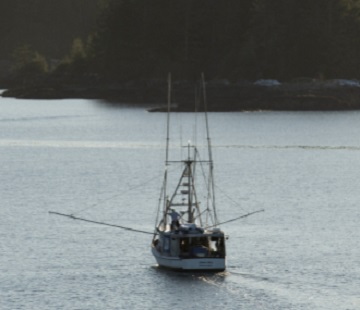
Seattle judge’s ruling might cancel Alaska commercial king salmon season
A ruling from a U.S. judge in Seattle could effectively shut down commercial king salmon trolling in Southeast Alaska, a valuable industry that supports some 1,500 fishermen, after a conservation group challenged the harvest as a threat to endangered killer whales that eat the fish. Wild Fish Conservancy, the organization that brought the lawsuit, heralded the decision as the most significant government action in decades to provide more food for starving orcas. But fishing organizations condemned the ruling, saying it threatens the region with economic disaster and would do little or nothing to benefit orcas. The state of Alaska quickly announced an appeal. >click to read< 10:12
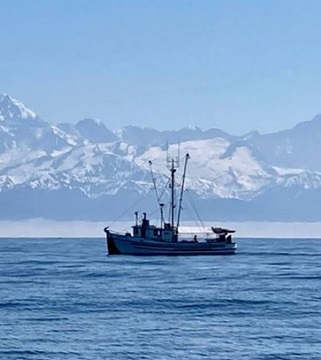
Lawsuit threatens Washington’s commercial fishing families | Opinion
While Alaska might be more than 1,000 miles away, Washington shares a lot more with the 49th State than most people realize. This is especially true in the fishing industry where the relationship between Washington and Alaska runs deep and ripples throughout Washington’s economy and communities. We are seeing the complexities and the nuances of this relationship play out right now in a lawsuit that the Seattle-based Wild Fish Conservancy brought against the National Marine Fisheries Service in 2020 with the goal to shut down southeast Alaska’s small boat, hook-and-line Chinook troll fishery in the misguided name of saving the Southern Resident killer whales. >click to read< 14:57
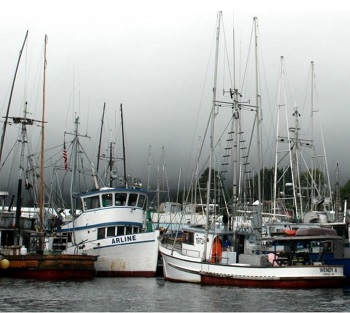
Southeast Alaska communities set to join opposition to lawsuit that threatens king salmon fishery
Ketchikan, Wrangell and Petersburg are set to join a growing chorus of Alaska voices highlighting the impact the suit could have on the region’s fishing fleet. The lawsuit from the Washington state-based Wild Fish Conservancy centers on an endangered Puget Sound population of orcas known as Southern Resident killer whales. Killer whales eat salmon, especially big, meaty king salmon, and the conservation group argues federal officials haven’t properly accounted for the impact the Southeast king salmon fishery has on the Puget Sound orcas. Late last year, a federal judge issued a report that threatens to close the Southeast king salmon fishery until the National Marine Fisheries Service comes up with a fix. >click to read< 11:50
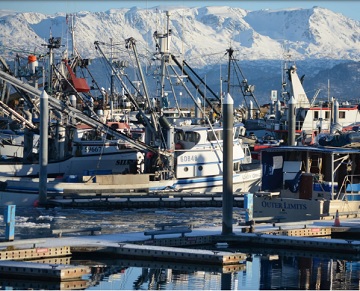
Lawsuit threatens to shut down Southeast salmon troll fishery
An ongoing lawsuit by a Washington State environmental group is threatening to shut down the Southeast Alaska salmon troll fishery in the summer and winter to help endangered Puget Sound orca whales, and has prompted the trollers to ask the City of Sitka to help pony up for legal bills. The Seattle-based group Wild Fish Conservancy filed suit last year and a federal court ruled last August that the National Marine Fisheries Service had violated the Endangered Species Act and the National Environmental Policy Act in approving salmon harvests in the Southeast troll fishery, which catches chinook salmon, a key food source for the Puget Sound orcas. In the meantime, lawsuits and rulings are continuing. >click to read< 08:36
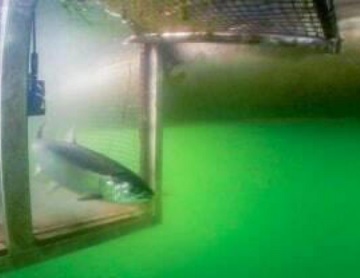
Commercial fish traps can aid wild salmon recovery
A new study evaluating alternative commercial fishing techniques further demonstrates the critical role commercial fish traps can play in recovering wild salmon and steelhead, improving fisheries management, and providing new sustainable fishing opportunities for coastal fishing communities. The publication confirms the ability of fish traps (or pound nets) to nearly eliminate unintended mortality of threatened salmon and steelhead encountered in commercial salmon fisheries of the Columbia River. >click to read< 18:09
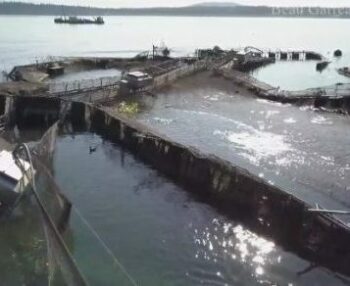
Judge hears lawsuit over fish farms in Puget Sound
Whether Cooke Aquaculture’s plan to raise native steelhead at fish farms in Puget Sound is a simple business transition or a complex threat to the marine ecosystem is being debated in King County Superior Court. Judge Johanna Bender heard testimony Thursday over Zoom in a lawsuit environment groups brought against the state Department of Fish & Wildlife for granting a permit to the seafood company to raise steelhead. “Did the department make a mistake in comparing the impacts of one type of stock to another, as opposed to comparing it to Puget Sound without fish farming at all?” she said.,, , the state Legislature passed a law that phases out Atlantic salmon net pen aquaculture by 2022 >click to read< 15:48
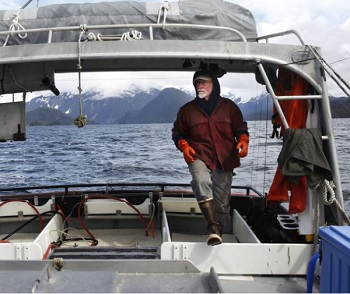
A win for Alaska trollers – Judge denied request for injunction to keep season closed
Magistrate Judge Michelle Peterson, of the US District Court of Western Washington, ruled on Tuesday (6-9-20) that an injunction petition filed by a Washington state environmental organization to protect killer whales circumvents established fisheries law. During oral arguments before her in May (5-28-20), Judge Peterson put hard questions to counsel for the Wild Fish Conservancy about whether the federal court had jurisdiction over the case, when the matter had not been tested before the Alaska Board of Fisheries, or the National Marine Fisheries Service — organizations which have regulated fisheries for the last four decades under the overall umbrella of the Magnuson-Stevens Act. So Judge Peterson’s ruling wasn’t unexpected. Nevertheless Kurt Beardslee, executive director of the Conservancy, says he’s disappointed. >click to read< 08:14
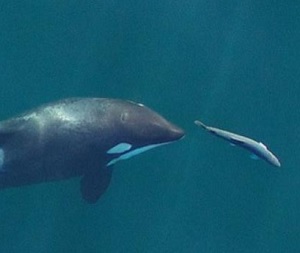
Judge weighs shutting down Southeast Alaska Chinook fishery
Fishermen in Southeast Alaska could see their season cut short if a federal judge issues an injunction requested by a Washington environmental group to protect the food supply of a subpopulation of orcas. The Wild Fish Conservancy filed a lawsuit against NOAA,,, “We are getting blamed for harvesting their food source, which really isn’t the cause of the problem,” Amy Daughery, executive director of the Alaska Trollers Association said. “The problem as we see it, is the exponential population growth in Seattle, which has lead to a lot of toxicity and pollution and habitat loss in that area. And so these whales are really struggling, this one population. The Northern killer whales that we see off the coast of Southeast Alaska are doing very well. In fact they’ve increased.” >click to read< 10:19
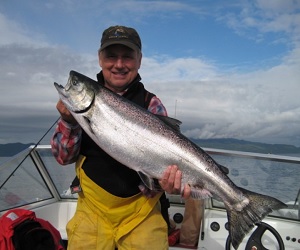
Destroying a fishery will not save Southern Resident Killer Whales – Scientists say feed starving whales farmed salmon
In less than two weeks, a Seattle-based federal judge will decide the fate of some 1,600 Southeast Alaska salmon trollers—fishermen who are already looking at the lowest allotment of Chinook in 20 years, largely due to the past three Pacific Salmon Treaty agreements that have cut, by two-thirds, their allocation of these high-value, sought-after fish. If you haven’t been following the trade press or Alaska media in the past few weeks, you may not know that this group of largely rural Alaska fishermen are today facing the unthinkable: being put out of business—collateral damage as the result of a lawsuit filed by a Washington state-based NGO, the Wild Fish Conservancy (WFC), against the National Marine Fisheries Service (NMFS). In the lawsuit, WFC seeks a Preliminary Injunction to stop the Southeast Alaska summer troll fishery, alleging that NMFS has failed to allow enough king (Chinook) salmon to return to Puget Sound to feed endangered Southern Resident Killer Whales,,, >click to read< 08:16
Feed starving whales farmed salmon, say scientists – “You could use well boats to deliver the farmed fish to where the whales feed.” >click to read<
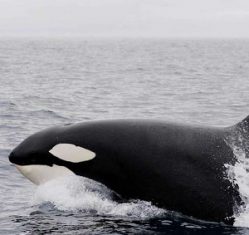
SE Alaska Chinook controversy attracts more user groups
A controversy over whether NOAA Fisheries is properly managing Chinook salmon stocks in Southeast Alaska, with consideration for a hungry whale population in decline, has been joined by sport and charter fishermen who say Alaska is not the problem. The environmental organization SalmonState, along with the Alaska Longline Fishermen’s Association and Alaska Trollers Association said on Monday, April 27, that sport and charter harvesters have joined them in support of NOAA Fisheries in a lawsuit brought by Wild Fish Conservancy, of Duvall, Washington. The group characterizes as misguided the decision of WFC to sue NOAA Fisheries in federal court to halt Chinook salmon trolling in Southeast Alaska effective July 1. >click to read< 16:15

Trollers side with NMFS in Chinook litigation – Endangered whales compete with increasing populations of seals, sea lions
Litigation to halt the Southeast Alaska king salmon fishery to provide sustenance for Southern Resident Killer Whales is prompting commercial trollers to intervene in the lawsuit brought by the Washington state based Wild Fish Conservancy. The Alaska Trollers Association in Juneau voted on Tuesday, April 21, to insert itself into the defense of the lawsuit filed in mid-March against the National Marine Fisheries Service and the subsequent injunction against king salmon fishing and the troll fishery specifically. >click to read< 15:41
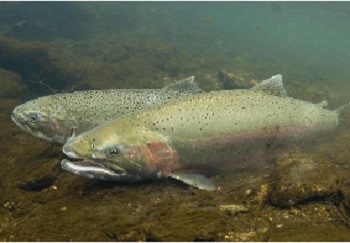
Washington Department of Fish and Wildlife Sued Over Steelhead Farming in Puget Sound
Environmental and conservation groups filed a lawsuit Tuesday against the Washington Department of Fish and Wildlife over the agency’s recent decision to allow Cooke Aquaculture to rear farmed steelhead trout in Puget Sound. The suit, filed in the Superior Court of Washington, alleges that the Washington Department of Fish and Wildlife issued a permit to allow steelhead fish feedlots, a type of fish-farming practice, to operate in the complex waterways of Puget Sound without any consideration of the consequences they would have on the environment. >click to read< 13:01
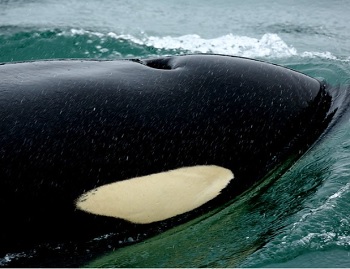
Suit targets Alaska salmon management to protect southern killer whales
The Wild Fish Conservancy filed notice on January 9, stating its intentions to sue the National Marine Fisheries Service for violating the Endangered Species Act, and jeopardizing the existence of Southern Resident Killer Whales. The Conservancy argues that an important food supply of the whales, endangered stocks of chinook salmon originating in Puget Sound, the lower Columbia River, the Willamette River, and Snake River is being depleted by the commercial troll and sport harvest in Southeast Alaska. >click to read< 20:51

Cooke Aquaculture agrees to pay $2.75M to settle lawsuit over salmon net-pen collapse
Cooke Aquaculture has reached a settlement to pay $2.75 million in legal fees and to fund Puget Sound restoration projects, putting an end to a Clean Water Act lawsuit that followed the 2017 collapse of one of the fish-farming company’s net-pen structures.,,, The legal settlement, which awaits federal officials’ review and a judge’s signature, bookends a contentious and litigious chapter in the fight over fish farming in Washington waters that resulted in the termination of some of Cooke’s leases, a $332,000 fine to Cooke from state regulators and a ban on farming nonnative fish, >click to read< 12:09
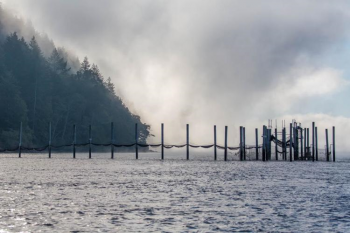
An experiment on the river – Researchers hope fish trap will be safer for wild fish
Fish traps have been outlawed in the Pacific Northwest for decades, but researchers plan to test an experimental trap in the Columbia River in hopes that it will be safer for wild fish than traditional fishing methods. Adrian Tuohy, a biologist and project manager for the Wild Fish Conservancy, said the proposed fish trap, also called a pound net, would be put in the Oregon side of the river so biologists can monitor how many fish are in the river and how many wild fish survive after being released. >click to read< 16:36
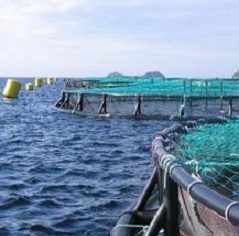
Canadian firm’s steelhead trout farm plan under the microscope after salmon escapes
Last month, a net pen used for fish farming and operated by Cooke Aquaculture Pacific began to dip below the surface off Bainbridge Island. A hole in a pontoon left the structure’s southeast corner partially submerged. Repairs were eventually made. But now as the New Brunswick-based Cooke seeks to farm steelhead trout — instead of the nonnative Atlantic salmon that state law will soon ban — the incident has caught the attention of state regulators. >click to read< 12:58
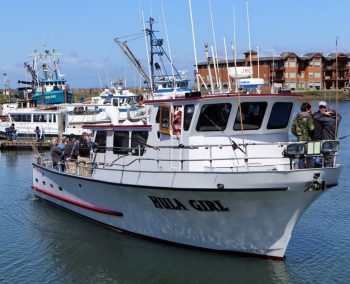
Charter fishing fleet casts wary eye toward possible fishing cutbacks to save orcas
Pacific Northwesterners are undeniably fond of their endangered resident killer whales. Many locals are also fans of salmon fishing, a hobby that sustains charter fishing fleets in coastal harbors from Neah Bay, Washington, to Brookings, Oregon. But now there is a chance future fishing trips on the ocean could be curtailed to leave more food for the killer whales. Regulators are preparing to reassess the Pacific salmon harvest and an environmental lawsuit seeks more action to save orcas. >click to read<
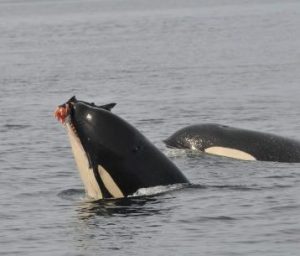
Environmental groups sue to restrict salmon fishing for Northwest orcas
The Center for Biological Diversity, which filed a lawsuit nearly two decades ago to force the U.S. government to list the orcas as endangered, and the Wild Fish Conservancy asked the U.S. District Court in Seattle on Wednesday to order officials to reconsider a 2009 finding that commercial and recreational fisheries did not jeopardize the orcas’ survival. >Video, click to read<10:09
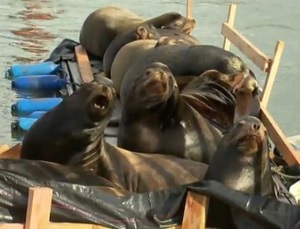
Conservation groups threaten lawsuit against Trump administration over salmon fishing
Two conservation groups say the federal government is violating the Endangered Species Act by failing to consider how salmon fishing off the West Coast is affecting endangered killer whales. The Arizona-based Center for Biological Diversity and the Washington state-based Wild Fish Conservancy on Tuesday notified President Donald Trump’s administration that they intend to file a lawsuit within 60 days unless officials reevaluate whether the fishing further jeopardizes orcas that frequent the inland waters of the Pacific Northwest. Video, >click to read<15:39
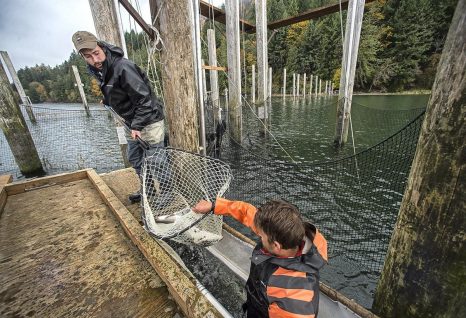
Columbia River commercial fishery could hinge on century-old method
A series of nets strung between pilings just off the Columbia River shore may offer a glimpse of the future of commercial fishing in the river, even though it harkens back to the fishing practices of a century ago. But some gillnetters say that the experimental fish trap, also known as a pound net, is just another unworkable idea for catching salmon that threatens their livelihoods. One morning last week, researchers from the Washington Department of Fish and Wildlife and the Wild Fish Conservancy worked the fish trap set in the Columbia a few miles upstream of Cathlamet, near Nassa Point. >click to read<09:34
Fish traps of past may help future of Columbia salmon
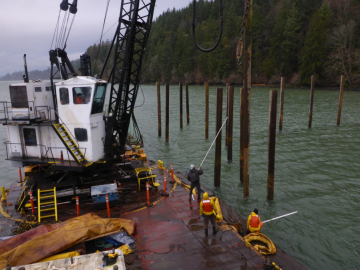 The once-outlawed commercial fishing technique has been generating fresh interest in the face of declining wild salmon runs and might offer a less lethal way of handling wild salmon while harvesting hatchery fish for the consumer. Fish traps were once used broadly in the Northwest during the early part of the last century to harvest salmon for the canneries, but they were eventually outlawed because they caught too many fish.,, Jim Wells is a member of the lower Columbia River gill-net fleet, and after the conservation group published its findings on the traps he did a little bit of research. Using the catch data from the trap, he figured just how many sell-able fish they had caught during this last season. click here to read the story 14:52
The once-outlawed commercial fishing technique has been generating fresh interest in the face of declining wild salmon runs and might offer a less lethal way of handling wild salmon while harvesting hatchery fish for the consumer. Fish traps were once used broadly in the Northwest during the early part of the last century to harvest salmon for the canneries, but they were eventually outlawed because they caught too many fish.,, Jim Wells is a member of the lower Columbia River gill-net fleet, and after the conservation group published its findings on the traps he did a little bit of research. Using the catch data from the trap, he figured just how many sell-able fish they had caught during this last season. click here to read the story 14:52
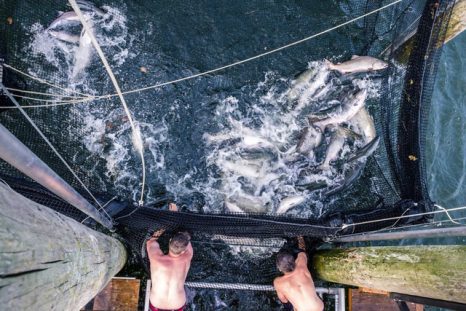
Fish traps for Columbia River salmon get another look
More than eight decades after their demise, fish traps are getting a fresh look from researchers convinced they offer a more sustainable way to catch Columbia River salmon. These traps are formed by nets attached to pilings that gently guide the fish into a kind of underwater corral. Wild fish protected under the federal Endangered Species Act can be released to resume their upstream journey, while their more abundant hatchery brethren are sent to the processors. These traps are formed by nets attached to pilings that gently guide the fish into a kind of underwater corral. Wild fish protected under the federal Endangered Species Act can be released to resume their upstream journey, while their more abundant hatchery brethren are sent to the processors. click here to read the story 12:55

Protest seeks shutdown of Atlantic salmon farms in Washington state
Activists in Washington state plan to launch a protest flotilla on Saturday in the Pacific Ocean’s Puget Sound over the accidental release of tens of thousands of farm-raised Atlantic salmon that they say threaten dwindling stocks of wild fish. The afternoon protest, which seeks to shut down farms that raise the non-native salmon in underwater pens, is expected to draw dozens of boats, kayaks and canoes on a route along the San Juan Islands where the spill happened. That raised fears they would compete with wild fish for food, prey on the young, and expose them to disease. Protesters said native fish like Chinook salmon and steelhead trout were already struggling before the spill. click here to read the story 13:26






